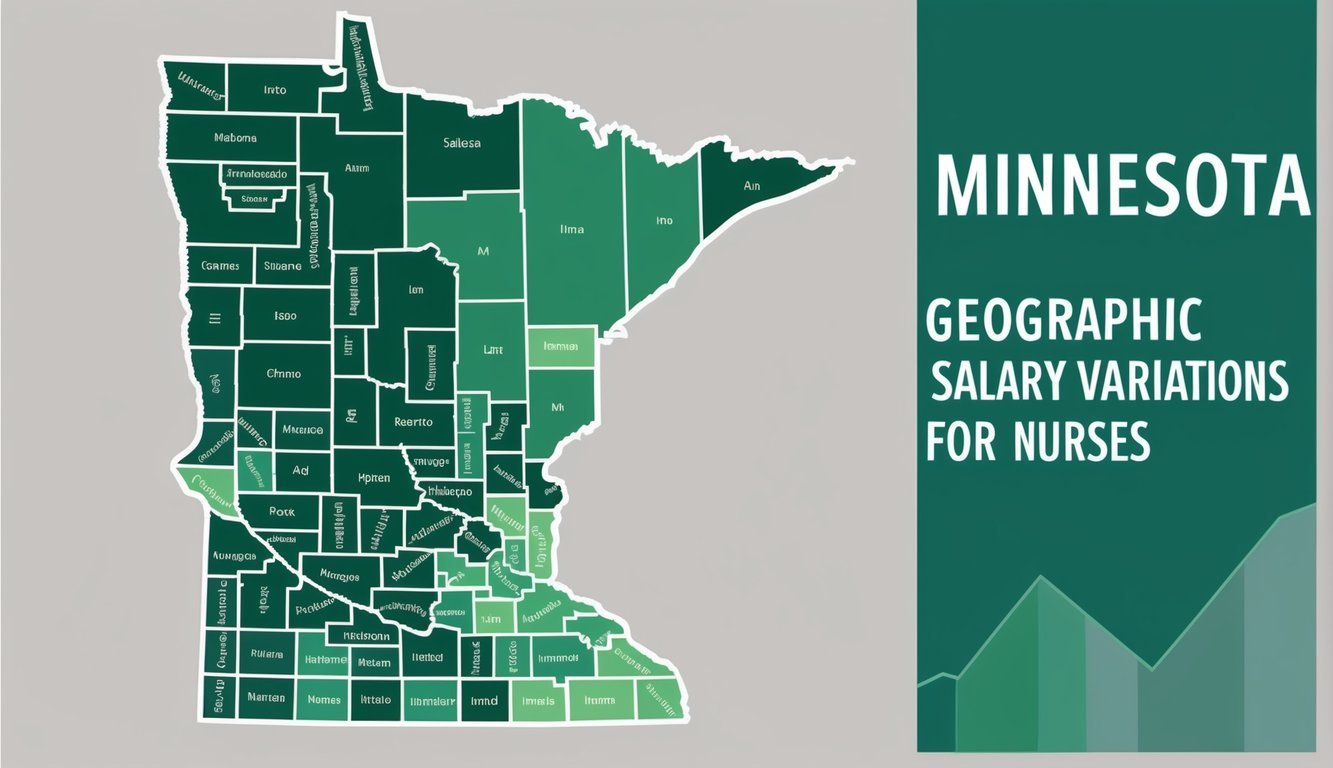Minnesota is known for its high-quality healthcare system, which means that its nurses play a crucial role in patient care. A registered nurse in Minnesota earns approximately $79,100 per year on average. This makes it a competitive choice for nursing professionals.
Whether you are a new graduate or an experienced RN, understanding salary trends and factors affecting pay can help you navigate your nursing career effectively.
In addition to base salaries, many nurses in Minnesota earn extra income through overtime and special certifications.
The variation in salaries can also depend on where you work within the state.
Some regions offer higher pay due to demand, while others may provide different benefits that offset lower salaries.
This blog post will explore various aspects of nursing salaries in Minnesota, including factors that influence pay, comparisons for advanced practice roles, and how the cost of living impacts overall earnings.
Key Takeaways
- Registered nurses in Minnesota earn an average salary of about $79,100 per year.
- Salaries can vary significantly based on geographic location within the state.
- Understanding local market trends can help nurses maximize their earning potential.
Overview of Nursing in Minnesota
Nursing in Minnesota offers a diverse range of roles and opportunities.
The state is home to various nursing programs that cater to aspiring nurses in different specializations.
Understanding the scope of nursing roles and the educational pathways available can help you make informed career choices.
Scope of Nursing Roles
In Minnesota, nursing encompasses several key roles, each with unique responsibilities.
Registered Nurses (RNs) provide direct patient care, administer medications, and collaborate with healthcare teams. Nurse Practitioners (NPs) have advanced training and can diagnose illnesses, prescribe medications, and deliver comprehensive care.
Nurse Anesthetists (CRNAs) specialize in anesthesia and play critical roles in surgical settings. Nurse Midwives focus on prenatal, childbirth, and postnatal care, offering services to expectant mothers.
Here’s a brief comparison of these roles:
| Nursing Role | Key Responsibilities |
|---|---|
| Registered Nurse (RN) | Patient care, medication administration, care plans |
| Nurse Practitioner (NP) | Diagnosis, treatment, and prescribing |
| Nurse Anesthetist (CRNA) | Anesthesia administration and monitoring |
| Nurse Midwife | Prenatal and childbirth care |
State-wide Nursing Programs
Minnesota offers numerous nursing programs across various educational levels, from associate to doctoral degrees.
Community colleges and universities provide pathways to become an RN, NP, or nurse midwife.
For RNs, Associate Degree in Nursing (ADN) and Bachelor of Science in Nursing (BSN) programs are widely available.
NPs typically need a master’s degree, while CRNAs must complete a Doctor of Nursing Practice (DNP) or a master’s in nurse anesthesia.
You can find reputable programs through resources like Minnesota State Colleges and Universities or the American Association of Nurse Anesthetists.
Each program equips you with the necessary skills and knowledge to succeed in the healthcare field.
Registered Nurse Salary Insights
When considering a career as a registered nurse (RN) in Minnesota, it’s important to understand how various factors affect salaries.
This section will look at the elements that influence RN pay and how Minnesota’s registered nurse salaries compare to national averages.
Factors Affecting RN Salaries
Several factors play a crucial role in determining the salary of registered nurses in Minnesota.
-
Experience: More experienced RNs generally earn higher salaries. Newly licensed nurses may start at the lower end of the pay scale, while those with years of practice can achieve salaries well above the average.
-
Location: Urban areas often offer higher salaries compared to rural settings. For example, RNs in cities like Minneapolis typically make more than those in smaller towns.
-
Specialization: RNs who specialize in areas such as critical care, pediatrics, or anesthesia may command higher salaries due to the advanced skills required.
-
Education: RNs with higher degrees, such as a Bachelor of Science in Nursing (BSN) or advanced practice registered nurses (APRNs), tend to earn more.
According to a recent report, the average registered nurse salary in Minnesota is around $79,100 per year, with variations based on the factors mentioned.
Comparing RN Salaries to the National Average
Registered nurse salaries in Minnesota are competitive when compared to the national average.
As of October 2024, the average RN salary in Minnesota is about $79,100, which translates to approximately $38.03 per hour.
In contrast, the national average hovers around $77,600 annually.
| Location | Average Annual Salary |
|---|---|
| Minnesota | $79,100 |
| National Average | $77,600 |
This table highlights the alignment between Minnesota’s registered nurse salaries and those nationwide.
The differences can be attributed to the cost of living and demand for healthcare services in various regions.
Overall, Minnesota provides a solid pay scale that reflects both regional and national trends for registered nurses, making it an attractive option for nursing professionals.
Advanced Practice Nursing Salaries

Advanced practice nursing roles such as nurse practitioners, nurse anesthetists, and nurse midwives offer competitive salaries.
Understanding the financial landscape in Minnesota for these professionals can help you make informed career decisions.
Nurse Practitioner Salary Trends
In Minnesota, the average salary for a nurse practitioner (NP) is around $128,160 per year, which breaks down to approximately $61.62 per hour.
Many NPs reach this salary level after nine years of practice.
Earnings can vary based on location, experience, and specific healthcare settings.
Here’s a quick overview of key factors that affect NP pay:
| Factor | Impact on Salary |
|---|---|
| Experience | Higher with more years |
| Location | Urban areas tend to pay more |
| Specialization | Certain specialties earn more |
You can find more information about nurse practitioner salaries in Minnesota here.
Nurse Anesthetist Financial Prospects
Nurse anesthetists (CRNAs) are among the highest-paid advanced practice nurses in Minnesota.
Their average annual salary is approximately $165,000.
This figure can fluctuate based on factors like experience and the type of facility.
Some essential elements influencing CRNA salaries include:
| Element | Salary Impact |
|---|---|
| Type of Employment | Hospitals pay more |
| Geographic Location | Higher pay in cities |
| Level of Experience | Increased salary with years |
For more insights into CRNA earnings, you can check this resource.
Nurse Midwife Earnings Overview
Nurse midwives in Minnesota also enjoy competitive salaries, averaging about $124,000 annually.
Factors such as practice setting and level of experience play a significant role in determining their income.
Key aspects of nurse midwife pay include:
| Aspect | Salary Consideration |
|---|---|
| Setting | Clinics vs. hospitals |
| Experience | More experience equals higher pay |
| Certification | Specialized certifications can boost salaries |
For further details on nurse midwife salaries, visit this site.
Geographic Salary Variations

Salary levels for nurses in Minnesota can vary significantly depending on the city or region.
Understanding where the highest-paying opportunities exist can help you make informed career decisions.
Highest Paying Cities in Minnesota
When looking for high-paying nursing positions in Minnesota, certain cities stand out.
Here are some of the top earners:
| City | Average Nurse Salary | Key Features |
|---|---|---|
| Rochester | $84,000 | Known for the renowned Mayo Clinic, this city offers numerous healthcare jobs. |
| Bloomington | $79,000 | A central hub for healthcare facilities, often provides competitive salaries. |
| St. Cloud | $77,000 | Growing demand in community health services leads to increased salary potential. |
Rochester leads with the highest average salary among nurses in Minnesota, largely due to its prominent medical facilities.
Bloomington follows closely, benefiting from various healthcare organizations. St. Cloud also presents attractive salaries, especially with expanding services in the area.
For more details on nursing salaries by city, you can check resources like GovSalaries.
By targeting your job search in these cities, you can maximize your earning potential as a nurse in Minnesota.
Cost of Living and Nursing Salaries
Understanding the relationship between cost of living and nursing salaries in Minnesota is crucial.
Different regions in the state have varying living expenses, which can significantly affect your take-home pay as a registered nurse.
Salary Adjustments Based on Living Expenses
The cost of living index in Minnesota varies by location.
Urban areas, such as Minneapolis and St. Paul, generally have higher living costs compared to smaller towns.
For example, consider the average registered nurse salary:
| Location | Average RN Salary | Cost of Living Index |
|---|---|---|
| Minneapolis | $79,100 | 106.4 |
| Rochester | $77,000 | 96.0 |
| Duluth | $72,000 | 93.4 |
As shown, while salaries might be higher in cities, the cost of living can offset your earnings.
In contrast, areas with lower salaries often have reduced living expenses, making them more affordable.
Be sure to evaluate local housing costs, transportation, and other necessities when considering job offers.
This assessment helps you understand your financial situation better in various Minnesota locales.
Frequently Asked Questions

In this section, you will find detailed answers to common questions about nurse salaries in Minnesota.
These insights will help you understand the compensation landscape for various nursing roles in the state.
What is the average hourly wage for a registered nurse in Minnesota?
The average hourly wage for a registered nurse in Minnesota is approximately $40.40.
This amounts to an annual salary of around $84,030.
Rates can differ based on experience, location, and the healthcare facility.
How do entry-level RN salaries in Minnesota compare with experienced RNs?
Entry-level RNs in Minnesota typically earn between $60,850 and $75,045.
In contrast, experienced RNs can make between $92,517 and $101,610 per year, reflecting their skills and expertise in the field.
What can LPNs expect to earn annually in Minnesota?
Licensed Practical Nurses (LPNs) in Minnesota can expect to earn an annual salary ranging from $46,000 to $55,000.
This amount can vary depending on experience and the specific healthcare setting.
What is the typical salary range for Nurse Practitioners working in Minnesota?
Nurse Practitioners (NPs) in Minnesota earn a typical annual salary between $100,000 and $120,000.
The range often depends on specialty, location, and years of experience in the field.
Are travel nurses compensated differently than permanent staff nurses in Minnesota?
Yes, travel nurses generally receive higher compensation than permanent staff nurses.
This pay difference accounts for the temporary nature of travel positions and the flexibility required in these roles.
Does holding a BSN affect the salary of nurses in Minnesota?
Yes, holding a Bachelor of Science in Nursing (BSN) can positively impact your salary in Minnesota.
Nurses with a BSN often earn more compared to those with an Associate’s degree.
Salaries increase by roughly 10-20%.

